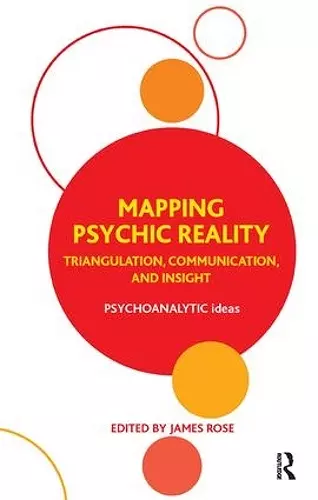Mapping Psychic Reality
Triangulation, Communication, and Insight
James Rose author James Rose editor
Format:Paperback
Publisher:Taylor & Francis Ltd
Published:31st Dec '11
Currently unavailable, and unfortunately no date known when it will be back
This paperback is available in another edition too:
- Hardback£135.00(9780367106881)

This book is about how we can deepen our understanding of subjectivity through the use of the concept of triangulation. Fundamentally, this book seeks to address the question of how we can be objective about subjectivity. If psychology, as a scientific discipline, is concerned with the study of human experience, which is essentially subjective; then we are faced with the problem of how apply the scientific method, as it is commonly understood. If experience is essentially unique to the experiencer, then there seems to be a basic incompatibility with the scientific method. As currently practised, this method searches for psychic phenomena, which can be validly measured e.g. intelligence; showing a range of individual differences. But this does not enable us to examine individual experience. An individual's experience seems to become impenetrable because generalisation across different individuals' experience entails the loss of individuality in the generalisation. Thus, in using the scientific method as it usually understood, we lose the very matter we are trying to study. This leaves us with the question of how we are going to advance our inquiry.
'This is an important book, which tackles, both with theoretical and clinical papers, the complex question about how we can be objective about our subjective experience. The concepts of "triangulation" and "the third" provide ways of trying to organize answers to this question. Indeed, the book itself provides a "third" area; a space where one can seriously consider and observe the nature of the psychoanalytic experience from a point of view that takes account of both the subjective experience of patient and analyst while also trying to think objectively about their experience, in ways that are consistent with psychoanalytic thinking. To do this, various authors have drawn on psychology, philosophy, history, natural science, and mathematics, as well as turning specific attention to the psychoanalytic relationship. It is an impressive collection, which I would very much recommend.'- Dr Roger Kennedy, Training Analyst and Past President British Psychoanalytical SocietyContentsACKNOWLEDGEMENTS; ABOUT THE EDITOR; INTRODUCTIONPART I: TRIANGULATION, COMMUNICATION, AND INSIGHTIntroductionCHAPTER ONE: Experimental psychology and psychoanalysis: what we can learn from a century of misunderstanding - Paul WhittleCHAPTER TWO: The third: a brief historical analysis of an idea - Charles M. T. HanlyCHAPTER THREE: Triangulation, one's own mind, and objectivity - Marcia CavellCHAPTER FOUR: Subjectivity, objectivity, and triangular space - Ronald BrittonPART II: TRIANGULATION IN THE TEMPORAL DIMENSIONIntroductionCHAPTER FIVE: Consultation or assessment: engagement and treatment decisions in psychotherapy with young people in a community-based setting - James S. RoseCHAPTER SIX: Is twice a week enough? Thinking about the number of sessions per week as a determinant of the intensity of psychoanalytic psychotherapy - James S. RosePART III: TRIANGULATION IN THE PSYCHOANALYTIC SETTINGIntroductionCHAPTER SEVEN: Distortions of time in the transference: some clinical and theoretical implications - James S. RoseCHAPTER EIGHT: Symbols and their function in managing the anxiety of change: an intersubjective approach - James S. RoseCHAPTER NINE: The presence of absence in the transference: some clinical, countertransference, and metapsychological implications - James S. RoseCHAPTER TEN: Couples, doubles, and absence: some thoughts on the psychoanalytical process considered as a learning system - James S. RosePART IV: SOME METAPSYCHOLOGICAL SPECULATIONS AND SOME TECHNICALCONCLUSIONSReflections and summaryINDEX
ISBN: 9781855758148
Dimensions: unknown
Weight: unknown
304 pages